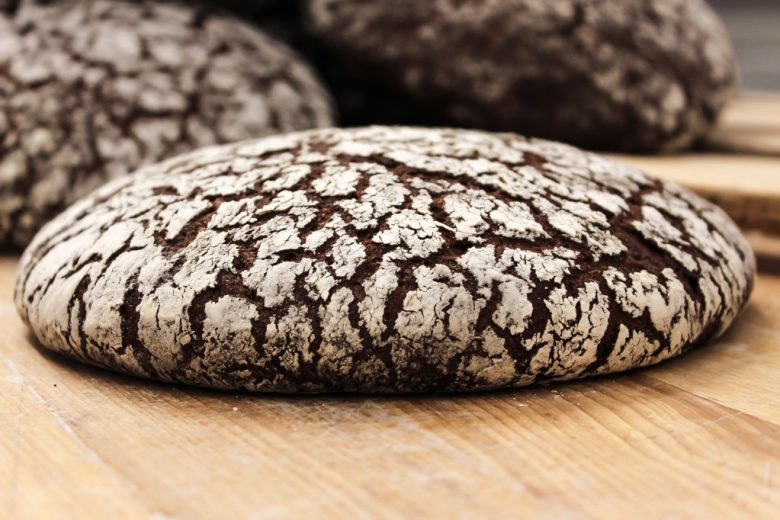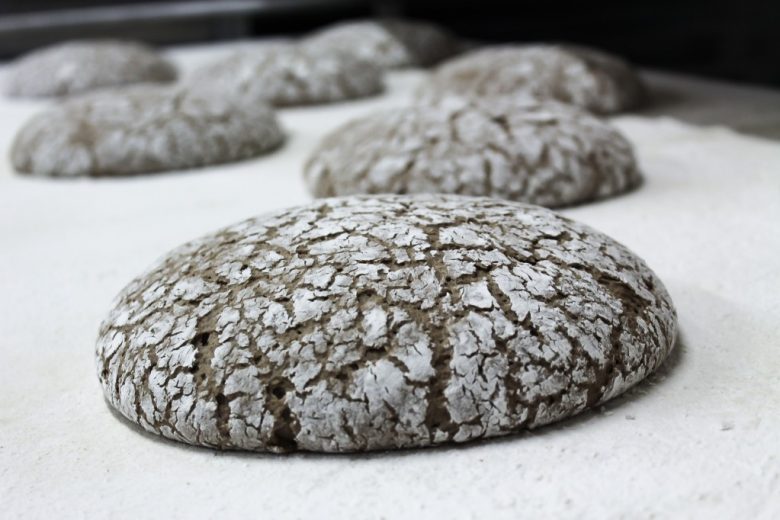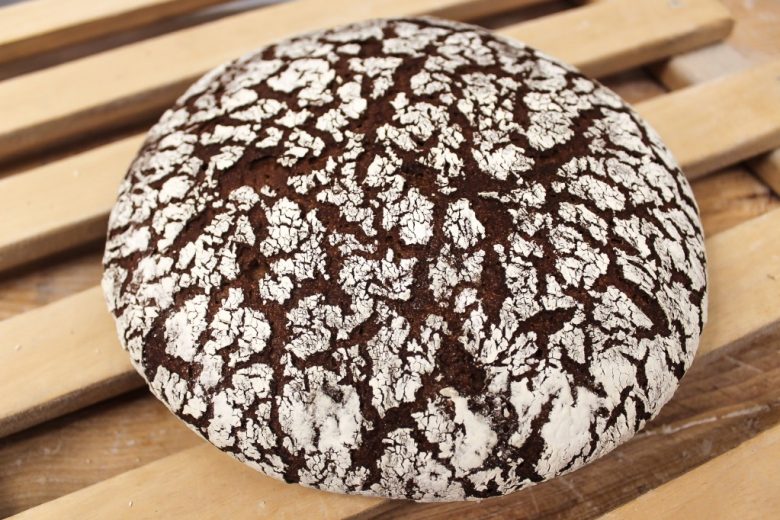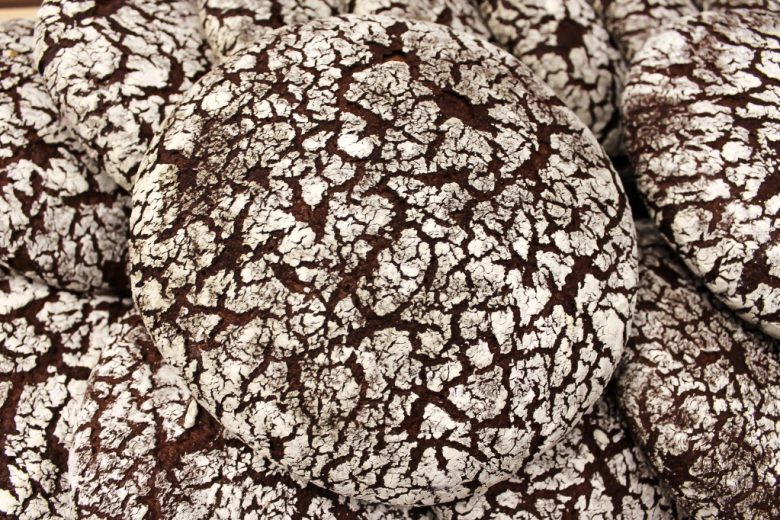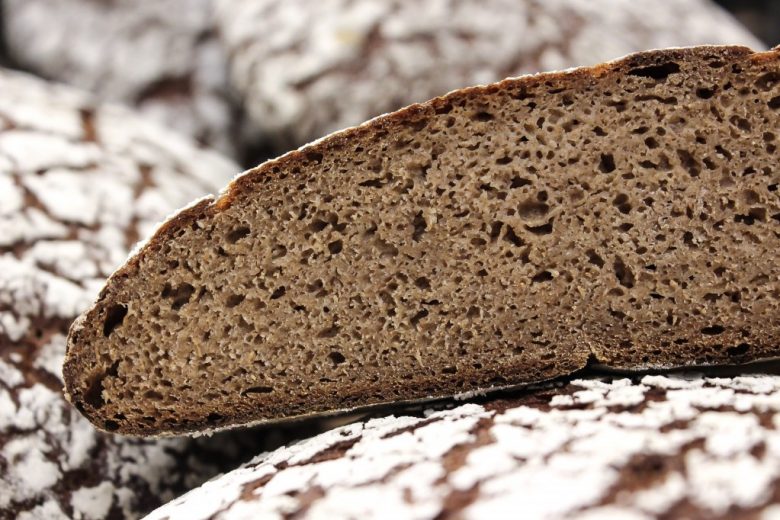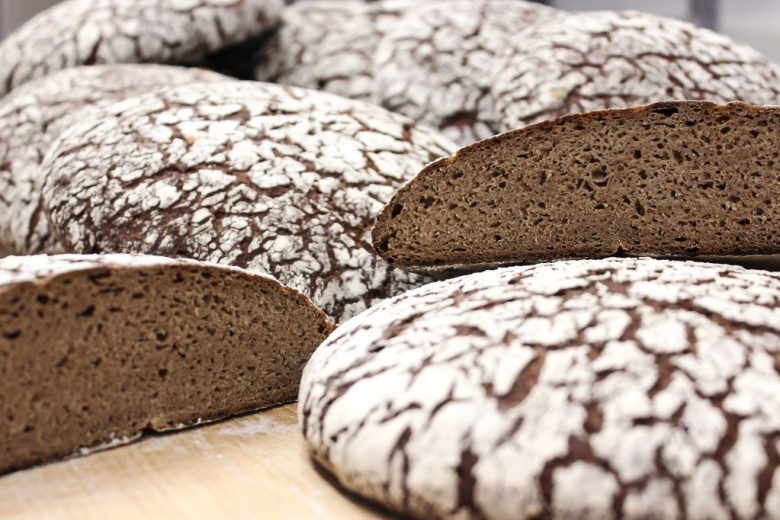Pane di farina di segale (Rye Bread)
The key to making good wholegrain bread is a flawless sourdough. Any type of sourdough is suitable for making wholegrain breads, provided it is based on wholegrains. For conventional rye breads, 34-45% of the flour is soured in order to achieve a stable and cohesive crumb. This amount can be reduced when using coarse rye meal for the bread. The reason for this is that the coarse rye meal absorbs water slowly and will stiffen in the dough. This will lead to a moist crumb even without the souring steps. However, breads made this way are not of particular quality. They are tight structured, not very flavorful and tend to mold quickly.
Basically:
- Fine meal and wholemeal flour require a stronger acidification than coarse meal, for which a mildly acidic flavor is typical.
- Medium-sized meal, on the other hand, absorbs large amounts of water during the preparation of the dough due to its large surface area. Sufficient souring with sourdough is therefore essential for a solid crumb.
- The finer the meal used, the higher the acid content required. This can be up to 50% of the total amount of wholemeal.
- The softer the dough, the higher the sourdough content.
Higher Hydration Sourdough:
When making sourdoughs with whole-grain rye flour and whole-grain rye meal, larger bulk liquid amounts are used and thus higher sourdough hydration arises depending on the water absorption capacity of the meal. As a rule, these are TA 180-220% and can also be higher for various types of meal.
Single-stage sourdoughs sufficiently swell:
In baking practice, single-stage sourdough methods have proven to be particularly effective overnight, as they guarantee sufficiently long swelling times, especially with coarse meal.
Recommended are:
- Detmolder Single-stage process (Depending on the sourdough amount and temperature can range from mildly sour, heartily sour, or robustly sour)
- Monheim salt sourdough process (mildly sour)
- Berliner Quick-Sour process (especially mild!!)
If the wholegrain sourdoughs are made with wholegrain rye flour or fine rye meal, where higher levels of acidity are achieved, some bakeries like to use “mild” sourdough processes such as the Berlin quick sourdough process to cushion any peaks in acidity.
The Berlin Quick-Sour process is most suitable for fine to medium meals, due to the shorter standing time of only 3 hours. Coarse meals do not sufficiently hydrate during this time. Medium and coarse meals, on the other hand, have a milder acidity and are therefore tried and tested in the one-step sourdough process.
Recipe
For a dough weight of 1650g / 2 pieces, each 825g of dough
Wholegrain Sourdough:
- 300g Wholegrain rye flour, finely ground
- 360g Water (ca. 40°C)
- 15g Starter
Sourdough temperature: 24-26°C Maturity time: 15-18 hours
Main dough:
- 675g Mature sourdough
- 450g Wholegrain rye flour, finely ground
- 330g Water (approx. 35-40°C)
- 150g Bread soaker (100g Water + 50g leftover bread)
- 18g Salt
- 18g Honey
- 9g Yeast
Instructions:
- Mix the sourdough, wholegrain flour, bread soaker, and water slowly for 7 minutes.
- Then cover and allow to hydrate for 15 minutes.
- Add the salt, honey, and yeast and slowly mix for another 5 minutes.
- After kneading the dough, cover and let it rest for 20 minutes.
- Divide the dough into 2 equal-sized pieces, shape into round loaves, and place onto baking paper with the seam-side down. To decorate, the loaves are dusted with rye flour.
- The proof lasts until a nice and even pattern has formed on the top (the perfect proof point is reached when the cracks are approx. 3-4 mm in size).
- Slide into the oven preheated to 250°C with moderate steam (to get the best possible oven spring the dough is slid straight onto the baking stone with the baking paper!)
- Release the steam after 4 minutes and after another 5 minutes the oven temperature is reduced to 200°C.
- Baking time should take about 55 minutes.


